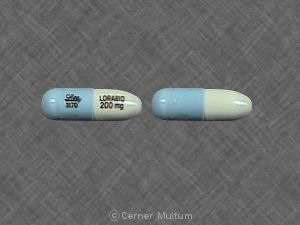Loracarbef Side Effects
Medically reviewed by Drugs.com. Last updated on Dec 2, 2024.
Applies to loracarbef: oral capsule, oral powder for reconstitution.
Important warnings
This medicine can cause some serious health issues
Do not take this medication if you are allergic to loracarbef, or to similar antibiotics, such as Ceftin, Cefzil, Duricef, Fortaz, Keflex, Omnicef, Spectracef, Suprax, and others.
Before taking this medication, tell your doctor if you are allergic to any drugs (especially penicillin).
Take this medication for the entire length of time prescribed by your doctor. Your symptoms may get better before the infection is completely treated. Loracarbef will not treat a viral infection such as the common cold or flu.
Antibiotic medicines can cause diarrhea, which may be a sign of a new infection. If you have diarrhea that is watery or has blood in it, call your doctor. Do not use any medicine to stop the diarrhea unless your doctor has told you to.
Get emergency medical help if you have any of these signs of an allergic reaction: hives; difficulty breathing; swelling of your face, lips, tongue, or throat.
Call your doctor at once if you have any of these serious side effects:
-
diarrhea that is watery or bloody;
-
seizure (convulsions);
-
fever, sore throat, and joint pain with a severe blistering, peeling, and red skin rash;
-
easy bruising or bleeding, unusual weakness; or
-
skin rash, bruising, severe tingling, numbness, pain, muscle weakness.
Less serious side effects of loracarbef may include:
-
mild itching or skin rash;
-
mild nausea, vomiting, stomach pain, loss of appetite;
-
warmth, redness, or tingling under your skin;
-
headache;
-
dizziness, drowsiness; or
-
vaginal itching or discharge.
This is not a complete list of side effects and others may occur. Tell your doctor about any unusual or bothersome side effect.
See also:
For healthcare professionals
Applies to loracarbef: oral capsule, oral powder for reconstitution.
General adverse events
Loracarbef is generally well tolerated.[Ref]
Gastrointestinal
Gastrointestinal side effects have included diarrhea (4.1%), nausea (1.9%), vomiting (1.4%), abdominal pain (1.4%), and anorexia. The incidence of side effects increases with higher doses. Pseudomembranous colitis has been reported in patients treated with beta-lactam antibiotics.[Ref]
Nervous system
Nervous system side effects have included headache (2.9%), somnolence, insomnia, and dizziness. Some beta-lactam antibiotics have been associated with seizures in renally impaired patients.[Ref]
Hypersensitivity
Hypersensitivity reactions have included rash (1.2%), urticaria, pruritus, and erythema multiforme. Anaphylaxis, serum-sickness-like reactions, and Stevens-Johnson syndrome have been reported rarely. Beta-lactam antibiotics have been associated with toxic epidermal necrolysis,[Ref]
Respiratory
Respiratory side effects have included rhinitis (1.6%).[Ref]
Hematologic
Hematologic side effects have included transient thrombocytopenia, leukopenia, and eosinophilia. Beta-lactam antibiotics as a class have been associated with agranulocytosis, aplastic anemia, hemolytic anemia, hemorrhage, positive direct Coombs' test, pancytopenia, neutropenia, and prolonged prothrombin time.[Ref]
Renal
Renal side effects have included transient elevations in serum creatinine and BUN. Some beta-lactam antibiotics have been associated with toxic nephropathy.[Ref]
Hepatic
Hepatic side effects have included transient elevations in AST (SGOT), ALT (SGPT), and alkaline phosphatase. Hepatic dysfunction including cholestasis with or without jaundice has been rarely reported. Some beta-lactam antibiotics have been associated with LDH elevations.[Ref]
A 73-year-old man developed itching and jaundice, pale stools, and right upper quadrant pain two weeks after completion of a four week course of loracarbef for pneumonia. Bilirubin, AST, ALT, alkaline phosphatase levels were elevated. Liver biopsy showed widening of portal areas, pericellular fibrosis, and irregular fibrous bands in the parenchyma. Swollen hepatocytes and cholestasis in the cytoplasma and canaliculi were observed. Lab values returned to normal after 10 weeks.[Ref]
Cardiovascular
Cardiovascular side effects have included vasodilatation.[Ref]
Genitourinary
Genitourinary side effects have included vaginitis (1.3%) and vaginal moniliasis (1.1%).[Ref]
References
1. Therasse DG (1992) "The safety profile of loracarbef: clinical trials in respiratory, skin, and urinary tract infections." Am J Med, 92, s20-5
2. (2002) "Product Information. Lorabid (loracarbef)." Lilly, Eli and Company
3. Brogden RN, McTavish D (1993) "Loracarbef. A review of its antimicrobial activity, pharmacokinetic properties and therapeutic efficacy." Drugs, 45, p. 716-36
4. Bjornsson E, Olsson R (1997) "Acute liver injury due to loracarbef." J Hepatol, 26, p. 739-40
More about loracarbef
- Check interactions
- Compare alternatives
- Reviews (1)
- Dosage information
- During pregnancy
- Drug class: second generation cephalosporins
- Breastfeeding
Patient resources
Other brands
Professional resources
Other brands
Related treatment guides
Further information
Loracarbef side effects can vary depending on the individual. Always consult your healthcare provider to ensure the information displayed on this page applies to your personal circumstances.
Note: Medication side effects may be underreported. If you are experiencing side effects that are not listed, submit a report to the FDA by following this guide.

